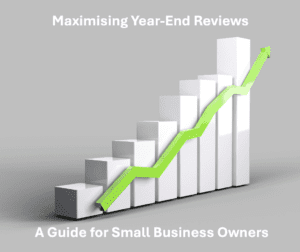Maximising Year-End Reviews
As the calendar year comes to a close, December offers a prime opportunity for small business owners to conduct year-end reviews and summarise the achievements of the past twelve months.
This period is crucial for reflecting on individual and business performance, setting the stage for future growth, and ensuring that employees feel valued and recognised for their contributions.
Here are some key strategies to make your year-end review process effective and impactful.
-
Preparation is Key
Before diving into the review process, it’s essential to gather all necessary data and feedback. This includes:
- Performance Metrics: Collect quantitative data on employee performance, such as sales numbers, project completion rates, and other relevant KPIs.
- Feedback: Gather feedback from various sources including peers, clients, and self-assessments. This comprehensive view can provide valuable insights into each employee’s performance.
- Self-Assessments: Encourage employees to complete self-assessments. This can offer insights into how they view their achievements and areas for improvement.
-
Set Clear Objectives
Ensure that the objectives of the year-end review are clearly defined. These may include:
- Recognising Achievements: Highlight and celebrate the successes and contributions of each employee.
- Identifying Areas for Improvement: Constructively discuss areas where performance can be enhanced.
- Career Development: Outline future goals and professional development opportunities.
-
Create a Positive Environment
The atmosphere during the review can significantly impact its effectiveness. Aim to create a positive, supportive environment where employees feel comfortable and valued. Tips for achieving this include:
- Active Listening: Show empathy and understanding by actively listening to employees’ perspectives and concerns.
- Constructive Feedback: Provide balanced feedback that acknowledges strengths while addressing areas for improvement in a constructive manner.
- Future Focused: Emphasise forward-looking goals and development plans rather than dwelling solely on past performance.
-
Utilise Tools and Technology
Leverage tools and technology to streamline the review process. Simple performance tracking tools or even spreadsheets can help track progress, manage feedback, and document reviews efficiently. This not only saves time but also ensures consistency and accuracy in the evaluation process.
-
Follow Up
The review process shouldn’t end with the meeting. Follow-up is crucial to ensure that the feedback and plans discussed are implemented. Schedule regular check-ins to monitor progress and provide ongoing support. This continuous engagement helps maintain momentum and demonstrates a commitment to employee development.
-
Celebrate Successes
Finally, take the time to celebrate the successes of the past year. This can be done through:
- Recognition Programs: Acknowledge top performers through awards, bonuses, or other forms of recognition.
- Team Celebrations: Organise team events or gatherings to celebrate collective achievements and foster a sense of unity and morale.
Conclusion
Year-end reviews are a vital component of the business calendar, offering a chance to reflect, recognise, and realign. By preparing thoroughly, setting clear objectives, creating a positive environment, utilising tools and technology, following up, and celebrating successes, small business owners can ensure that the review process is both meaningful and motivating.
As we wrap up the year, let’s make the most of this opportunity to acknowledge the hard work of our teams and set the stage for an even more successful year ahead.

